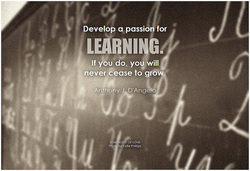ESSENTIAL QUESTION: What is the role of knowledge creation and sharing in a healthy educational organization?  I believe educational organization should foster a culture of knowledge sharing. Education organizations have similar moral purposes. The ultimate goal is greater than any one individual whether it be a student, teacher or administrator. Education or rather knowledge is meant to be shared. David Skyrme, in his article, “The 3 C’s of Knowledge Sharing: Culture, Co-opetion, and Commitment” (2002) lists some of the common reasons that prevent sharing: the perception that knowledge is power, pride and not wanting to seek advice from others, not wanting to discover new ways for themselves, not realizing how useful particular knowledge is to others, lack of trust and lack of time. Educational organizations should excel at knowledge sharing but that’s not always the case. By changing the culture around knowledge some of these barriers can be overcome. One of the best ways to encourage a culture of knowledge creation and sharing is by involving everyone. When all members feels like their knowledge is respected, and valued a positive culture can thrive. Creating communities in education that foster this are rooted in trust and respect not only in the members but also in the leadership. Team-building challenges and working towards united goals can also help. Another way to encourage sharing is through the use of role models. It is important to celebrate each other’s strengths. We can all bring something to the table. Sometimes we do a good job doing this in small circles of collaboration but it is also important to involve others outside our close circles. Education organizations are founded on the creation and sharing of knowledge yet we often lack the time and commitment to apply the same process to our professional learning growth. What we require of our students is suddenly not practical with ourselves. The creation of knowledge is important but equally so, what you do with that knowledge. Education organization should be looking at knowledge management like businesses. We should be collaborating, sparking innovations, and promoting ever-higher performances. I crave knowledge. I love learning. I hope there never comes a day were I stop seeking new knowledge. My weak area is time. There just so much to learn and so little time. I am very thankful to social media that allows me to connect and gather tidbits of information. Resources: Fullan, Michael. Leading in a Culture of Change. Somerset, NJ, USA: John Wiley & Sons, Incorporated, 2014. ProQuest ebrary. Web. 6 November 2015. Petrides, Lisa, and Thad Nodine. "ERIC - Knowledge Management in Education: Defining the Landscape., 2003-Mar." ERIC - Knowledge Management in Education: Defining the Landscape., 2003-Mar. N.p., n.d. Web. 12 Nov. 2015. <http://eric.ed.gov/?id=ED477349>. Rismark, Marit. "From Knowledge Sharing to Knowledge Creation: A Blended Knowledge-management Model for Improving University Students’ Creativity." From Knowledge Sharing to Knowledge Creation: A Blended Knowledge-management Model for Improving University Students' Creativity. ResearchGate, 19 Jan. 2015. Web. 12 Nov. 2015. <http://www.sciencedirect.com/science/article/pii/S1871187112000430>. Skyrme, David. "The 3Cs of Knowledge Sharing: Culture, Co-opetition and Commitment." The 3Cs of Knowledge Sharing. N.p., Aug. 2002. Web. 12 Nov. 2015. <http://www.skyrme.com/updates/u64_f1.htm>.
3 Comments
Theresa
11/14/2015 10:01:56 am
Cindy- I believe that point you make that that everyone should be involved and also they should feel that their knowledge is respected and valued. I think if they see that they will more likely share more often. No one wants to shares if no one respects or values their knowledge and if they had one bad experience that may prevent them from sharing again. I feel the same way that I love learning. I was telling my husband one time what am I going to do after I finish my classes? I will have so much time on my hands. He said, take more. I was like yeah I will have to see what I can find but I am so use to being busy that when my classes end it is going to feel like I have so much time. Lol!
Reply
Alison
11/14/2015 09:44:53 pm
You wrote: "When all members feels like their knowledge is respected, and valued a positive culture can thrive."
Reply
Creating communities within your classroom are so important. The kids learn to be a part of a social community, working together, creating together, and sharing together. But without that trust they gain from a strong community they would never be brave enough to put themselves and their ideas out there. Building a solid environment for your students where they feel that they can express themselves and get feedback from their input, can make a huge difference. Not only will they be willing to create and share, but they will also learn to give appropriate feedback to help their peers.
Reply
Leave a Reply. |
AuthorWrite something about yourself. No need to be fancy, just an overview. Archives
December 2015
Categories
All
|
 RSS Feed
RSS Feed
